[TICAD8 Side-Event Report] Japan empowers African youth by unlocking potential through education
October 7, 2022
Scholarship programs offered by the Japan International Cooperation Agency (JICA) and the African Development Bank (AfDB) are benefitting youth across Africa. A side event called "Value of Studying in Japan for Youth in Africa and Acceleration of the Partnership Between Africa and Japan" to the Eighth Tokyo International Conference on African Development (TICAD) was held online on August 23.
Africa is the world's youngest continent, with about 70 percent of its 1.4 billion people under the age of 30. Such youthful energy means Africa is brimming with potential that, if unlocked, will propel it to becoming a key driver of the global economy in the decades to come.
Japan recognizes that access to high-quality education and global people-to-people exchanges are key to building capacity in Africa. Through such efforts, Japan wants to enable sustainable growth and in turn, stronger resilience across Africa with a well-educated and highly-skilled talent pool. This was also a key theme at the TICAD8 conference in Tunisia on August 27 to 28.
There are two ongoing programs: the African Business Education (ABE) Initiative for Youth launched in 2013, and the Japan-Africa Dream Scholarship (JADS) that began in 2017. The former is implemented by JICA, and the latter by AfDB.
"Knowledge is the best investment that any society can make," said AfDB president Dr. Akinwumi ADESINA. "The more knowledgeable societies are, the more evenly distributed the knowledge, the higher the economic growth, and the better the health and living standards of people."

AfDB president Dr. Akinwumi ADESINA
JICA Special advisor to the President, Dr. KITAOKA Shinichi, shared Japan's modernization process where human resource development played an integral role and concurred: "To be the driving force of sustainable growth, the continent must urgently develop its human resources."
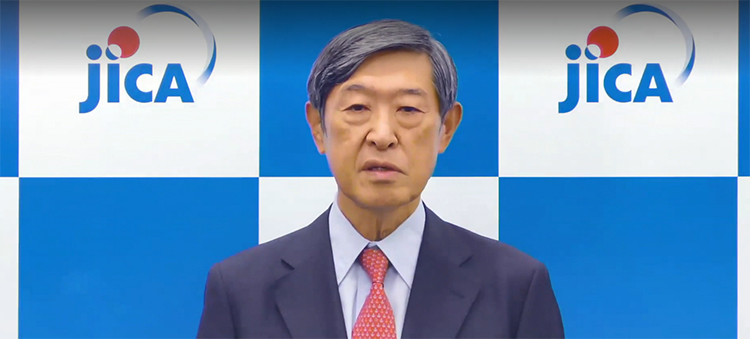
JICA Special advisor to the President, Dr. KITAOKA Shinichi
The ABE initiative, with about 1,500 participants thus far, offers scholarships for African youth to study at Japanese graduate schools, and then intern at Japanese companies. As many as 400 firms have offered internships, while 190 participants were eventually hired by the companies. Others leverage their connections and know-how made in Japan to begin new businesses when they return home.
JADS, which has a US$4 million investment by the Japan Policy and Human Resources Development Fund, offers fully-paid scholarships for African students to pursue postgraduate studies in Japan. This has benefited 17 Africans thus far, including six women.
JICA special advisor Mr. MIHARA Asahiko said that he hopes the initiatives can "foster young Africans who would lead the continent's future (and) become pioneers in developing their home countries through practical contributions in business, technology and knowledge".
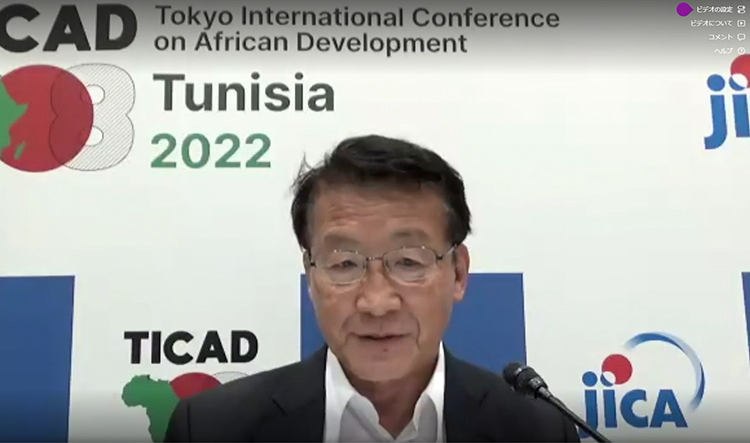
JICA special advisor MIHARA Asahiko
At the same time, Japanese companies can also benefit from stronger business ties with the continent. One such case in point is Yokohama-based water treatment firm Hinode Sangyo Co., Ltd., which has taken in over 60 interns from 22 African countries.
Its director Ms. FUJITA Kaori said that interns are encouraged to think of how Japanese technology can be used in their home countries, and to come up with action plans. Through this, Hinode Sangyo Co., Ltd. has entered into joint ventures in South Africa, Senegal and Morocco, she said.
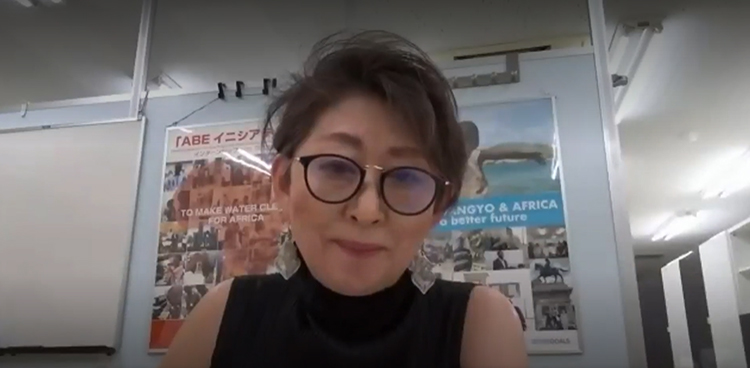
FUJITA Kaori, Director at Hinode Sangyo Co., Ltd.
SUCCESS STORIES
Even before the two ongoing initiatives, a JICA scholarship had benefited Dr. Edwin Paul MHEDE, who is now CEO of DAR Rapid Transit Agency in Tanzania. Dr. MHEDE did his Master's and PhD at the National Graduate Institute of Policy Studies (GRIPS) in Tokyo.

Dr. Edwin Paul MHEDE, CEO at Dar es Salam Rapid Transit Agency
While he observed that the skill sets among African youth are still "substantially weak", he added: "Optimism will prevail if Africa is a society where talent can rise to the top. This is fundamental to entrepreneurship and innovation development."
His juniors in both the ABE Initiative and JADS agree. Mr. Daniel Elliot KWANTWI, from Ghana, is an ABE Initiative alumnus who had studied at the University of Tokyo. He used his experience and know-how gained from Japan to found e-payments start-up TranSoniCa.
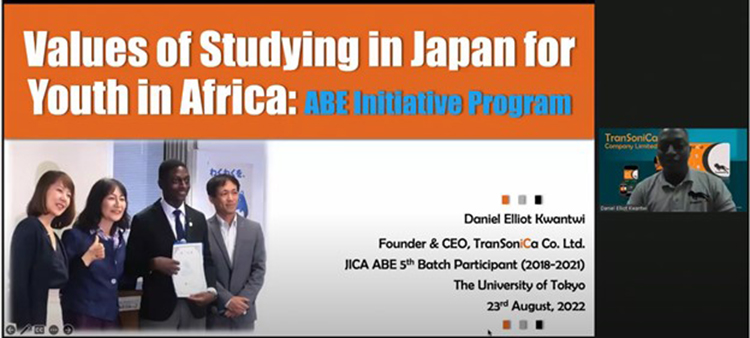
Mr. Daniel Elliot KWANTWI, Chief Executive Officer, TranSoniCa Co., Ltd.
He said: "The ABE Initiative brings participants much closer not just to Japan, but to Africa -- it brought me closer to all African countries through those who participated in this program."
Fellow alumna Ms. Ihuoma Nkechi AGADA, who now works at the Embassy of Japan in Nigeria, said that she feels more empowered in the workplace having learnt the 'Kaizen' way of doing business.

Ms. Ihuoma Nkechi AGADA, Grant Assistance for Grass-Roots Human Security Project Coordinator
at the Embassy of Japan in Nigeria
The term means "change for the better" and has been used as a business strategy to foster an atmosphere of continuous improvement. Ms. Agada says she hopes to be able to help spread the Kaizen way throughout Africa.
Her compatriot, Mr. Henry OKONKWO, is a JADS alumnus and now a mathematics teacher at the prestigious Hillview Comprehensive College in Nigeria's capital Lagos.

Mr. Henry OKONKWO, a mathematics teacher
at the prestigious Hillview Comprehensive College
in Nigeria's capital Lagos
Studying in Japan, with its emphasis on research, had changed his perspectives on pedagogy, he says. "At my school I am now advocating for blended learning that combines theoretical learning with scientific research."
Another JADS alumna Ms. Mercy KAVOO, of Kenya, said that she was grateful for the ability to "accumulate hands-on skills" that has honed her confidence through conference presentations and completing research projects.

Ms. Mercy KAVOO, a teacher at Oita International Academy
THE WAY FORWARD
Mr. MIHARA, the JICA special adviser, pointed out that the former Prime Minister of Japan, ABE Shinzo has long been a firm believer in joint growth in Japan and Africa. He said: "The seeds sown by the late Prime Minister ABE are definitely sprouting."
Dr. Beth DUNFORD, the AfDB's vice-president for agriculture, human and social development, said the AfDB will continue advocating for targeted investments that can bring employable skills, promote STEM (science, technology, engineering and mathematics), increase access to technical and vocational education, improve access to digital technology, while also supporting an environment that can foster youth entrepreneurship.
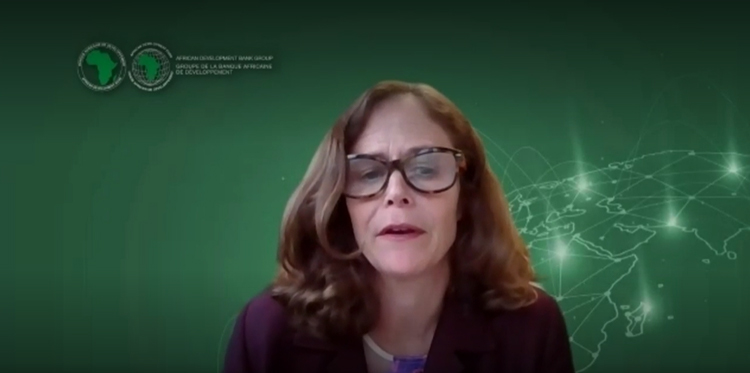
Dr. Beth DUNFORD, the AfDB's vice-president for agriculture, human and social development
Mr. NAKAMURA Toshiyuki, senior vice president at JICA, said JICA would strengthen the network between African youth and Japanese companies, and the collaboration with other organizations and schemes to improve the scholarship program. He also mentioned his expectation for African youth to contribute to development of their home country with Japan.
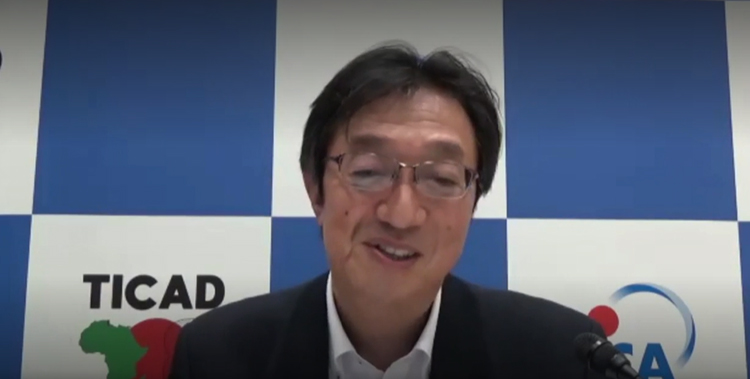
Mr. NAKAMURA Toshiyuki, senior vice president at JICA
Still, Mr. OHASHI Tetsuji, who chairs a committee on Sub-Saharan Africa at the Keidanren (Japan Business Federation), who is also Chairman of the Board at Komatsu Ltd, said: "Japan's public and private sectors need to unite in joining and supporting the effort of the African government and people by maximizing the use of our technologies, human resources and expertise."
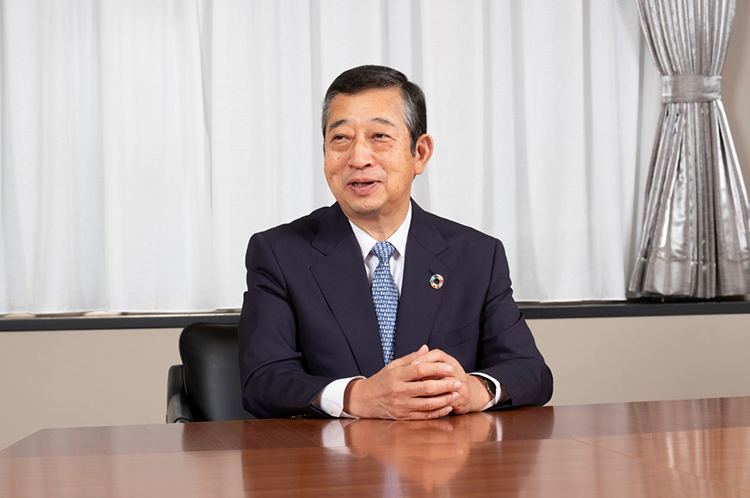
Mr. OHASHI Tetsuji, chairs a committee on Sub-Saharan Africa at the Keidanren
Mr. SHIBUSAWA Ken, vice-chairman of the Africa Project Team at the Keizai Doyukai (Japan Association of Corporate Executives), likewise suggested a public-private sector initiative to promote "impact investments" into Africa -- whether by Africa-founded start-ups or Japanese ventures entering Africa -- that can generate positive social and environmental outcomes.
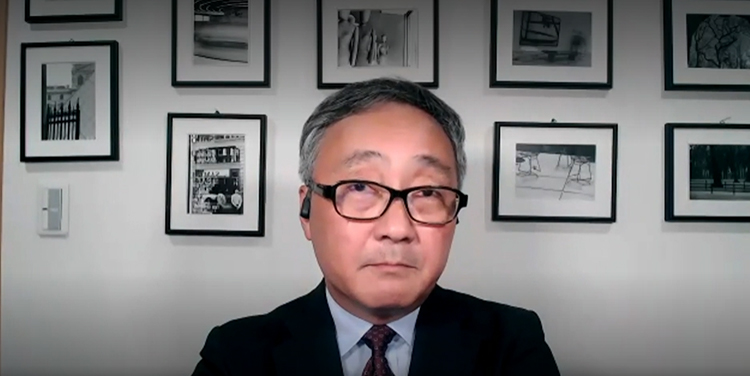
Mr. SHIBUSAWA Ken, vice-chairman of the Africa Project Team at the Keizai Doyukai
(Japan Association of Corporate Executives)
"Prime Minister KISHIDA Fumio's 'new form of capitalism' aims to promote a virtuous cycle of growth and distribution," he said. "I believe that this virtuous cycle needs to be global. The fruits of growth in Africa will also be felt in Japan."
The speakers from Africa and Japan discussed on the value of studying in Japan and how it accelerates Japan-Africa collaboration in this event.

